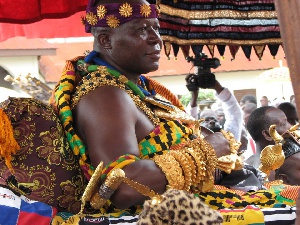The Asantehene, Otumfuo Osei Tutu II has insisted that traditional leaders in Africa are still useful and urgently needed in the proper development of the continent in these modern times.
Addressing participants at the second Norwegian/Africa Summit in Oslo, Norway, the Asantehene emphasized the need for traditional rulers on the continent to be included as key players in the development agenda of Africa.
He described as a deception, the notion that African traditional rulers had outlived their usefulness saying they were still very relevant.
“Contrary to what some may have you believe, our kings and chiefs are no relics of a bygone era. They remain not just the custodians of our tradition and culture, but the very embodiment of the hopes and aspirations of our rural people.”
He noted, “Chieftaincy in my country and in many African countries is one of the major components in the architecture of good governance, and the stability which we enjoy in Ghana today is owed greatly to our success in integrating our traditional governance into the new democratic structure.”
Citing some of their key roles he said “we are the primary arbiters in the resolution of conflict on a daily basis, helping to maintain peace and order at all levels. Presidents and governments look to us for advice and counsel from the perspective of non-partisanship, in the pursuit of their constitutional mandate.”
“Our traditional system of arbitration is now a source of considerable study among international legal authorities. And it is becoming clear that much of the conflicts in Africa arise in areas and under conditions of the breakdown of traditional authority,” he added
The Norwegian-African Business Association organizes the annual forum to create a common platform for political leaders, international technocrats, business executives and traditional leaders to brainstorm about what they can do transform the continent.
The Asantehene lamented the fast rate at which the continent’s forest reserves and other natural resources were being depleted with its attendant dangers to the environment.
“…In my country alone, close to 70% of the country’s forest reserves had suffered one form of degradation or another from only three short decades of the exploitation of forest resources.”
Africa, he said, ought to emulate the sound, sustainable forest management practices that countries like Norway had adopted so that it could continue to reap the benefit from its forest resources.
On culture, he said the lack of confidence on the part of African nationals was the reason the continent was retarding in development, saying it was time for Africans to believe their capabilities to develop and stop their over-reliance on foreign culture.
“This lack of confidence springs from the fact that we have allowed ourselves to be persuaded that there is nothing useful in our past, in our culture and tradition and way of life that is worth preserving and building upon…as a consequence, we have almost jettisoned our culture and traditions and surrendered to everything foreign.”
He urged Africans to uphold their cultures as they move forward to transform the continent, saying “neither Japan or China or any of the so-called Asian Tigers has achieved its status by abandoning their heritage.”
General News of Saturday, 20 October 2012
Source: Daily Guide

















